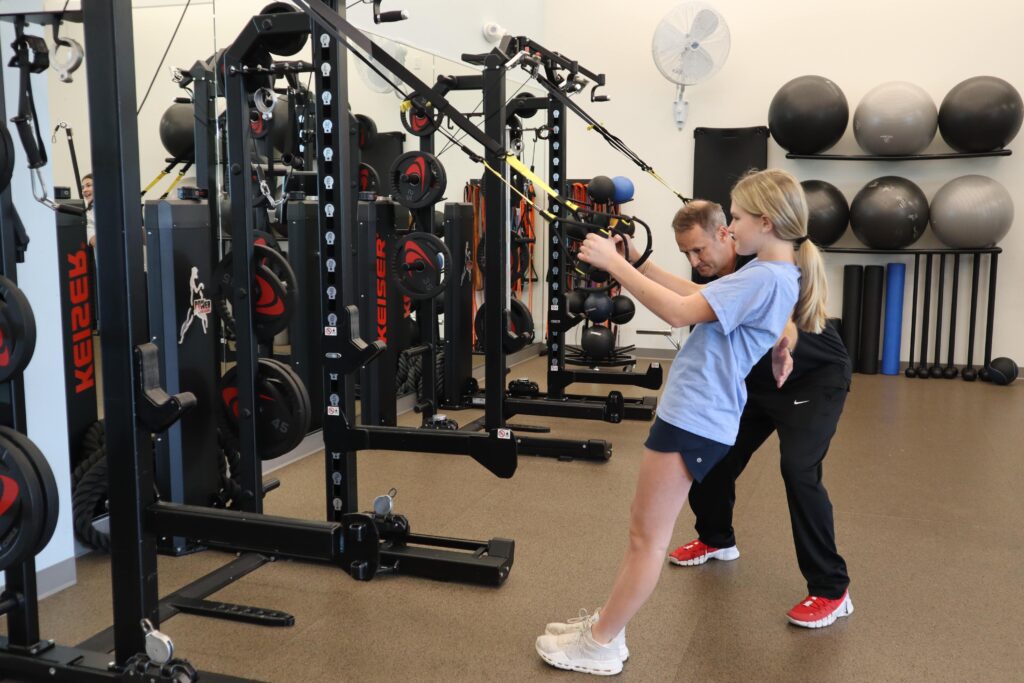Sports Performance Training: How to Boost Your Speed, Power and Agility
Whether you’re a competitive athlete, a weekend warrior or someone looking to move more athletically, sports performance training can take your capabilities to the next level. Unlike general fitness routines, performance training is designed specifically to develop the physical traits required for excelling in sports: speed, power and agility.
At Method Health Club, we help athletes of all levels improve movement mechanics, increase explosiveness and build total-body coordination using science-backed programming. This blog will guide you through the fundamentals of sports performance training and how you can start building a faster, stronger, more agile version of yourself.

What Is Sports Performance Training?
Sports performance training is a targeted, systematic approach to preparing the body for the physical demands of sport. It’s not about just lifting weights or running laps—it’s about training with intention to improve your performance on the field, court, track or wherever your sport takes place.
This type of training typically includes a blend of:
- Movement preparation and dynamic warmups
- Strength and resistance training
- Power and plyometric development
- Speed and acceleration mechanics
- Agility and multidirectional movement training
- Mobility, flexibility and recovery protocols
Each program is designed with the athlete’s sport, position, current performance level and goals in mind. The objective is to increase your ability to generate force quickly, move efficiently and reduce injury risk—all essential traits for peak performance.
Why Speed, Power and Agility Are Essential in Sports
When you break down what separates elite performers from average ones, three elements stand out: speed, power and agility. These traits affect your ability to compete, react and dominate in virtually every sport.
- Speed determines how quickly you can sprint, chase down an opponent or make a breakaway play.
- Power is the engine behind jumping, throwing, swinging and tackling.
- Agility allows you to decelerate, shift direction and react to dynamic gameplay with control.
Each quality complements the others. You may be fast in a straight line, but without agility, you’ll struggle in change-of-direction sports. You may be strong in the weight room, but without power development, that strength won’t translate into performance.
This is why high-quality sports performance training addresses all three in a structured, progressive manner.
How to Improve Speed with Sports Performance Training
Speed is a complex trait influenced by biomechanics, neuromuscular efficiency and strength. It’s not just about raw acceleration but also about how efficiently you can move through space. Our speed training is focused on refining sprint mechanics, improving stride frequency and length, and developing explosive first-step quickness.
Our Speed Development Methods Include:
Sprint Mechanics Training
Teaching athletes to run with correct form improves stride efficiency and reduces wasted motion.
Resisted Sprinting
Using sleds or resistance bands adds load to sprints, helping develop force in the acceleration phase.
Reaction-Based Sprints
These drills teach athletes to react to stimuli—visual, auditory or tactile—and accelerate quickly from various positions.
Plyometrics for Speed
Exercises like bounding, skips and hurdle hops build the fast-twitch muscle fibers essential for explosive movement.
By combining form-focused sprint work with explosive strength and neural training, athletes learn not just to run faster—but to move smarter.
How to Build Power Through Sports Performance Training
Power is defined as the ability to generate force rapidly. It’s the difference between lifting a heavy weight slowly and throwing it explosively. In most sports, athletes are required to express power quickly—whether in a vertical jump, a sprint or a rotational movement like a swing or a throw.
Our Approach to Power Training Includes:
Olympic Lifts and Derivatives
Movements like cleans and snatches are exceptional for training explosive triple extension (hip, knee, ankle), a key motion in nearly every sport.
Medicine Ball Training
Rotational throws, overhead slams and scoop tosses help transfer weight room strength into real-world movement patterns.
Jump Training
Box jumps, depth jumps and broad jumps train the elastic properties of muscles and tendons, essential for vertical and horizontal explosiveness.
Speed-Strength Work
This includes lifting moderate loads at high velocity using tools like bands, chains or velocity-based training methods to emphasize power over pure strength.
By developing both lower-body and upper-body power, athletes become more dynamic and resilient in their movement—able to produce high force outputs in game-time conditions.
How to Enhance Agility with Sports Performance Training
Agility is the ability to change direction efficiently while maintaining balance, posture and speed. It is not the same as speed or quickness; it involves perception, decision-making and movement execution—all at the same time.
Our Agility Training Focuses On:
Deceleration Mechanics
Teaching athletes how to stop and absorb force effectively to prepare for rapid changes in direction.
Multi Directional Drills
Cone drills, zig-zags and figure-eight patterns simulate real-life sport movement patterns.
Reactive Agility Training
We simulate unpredictable game-like scenarios where athletes respond to visual or auditory cues. This trains both physical agility and mental reactivity.
Unilateral and Core Stability Work
Exercises like single-leg squats and anti-rotation core drills build the stability required for dynamic control.
Sport-Specific Patterning
For example, a basketball player may work on shuffle-to-sprint transitions, while a soccer player may train lateral cuts into acceleration bursts.
Our goal is to help athletes move efficiently in any direction at any moment—without sacrificing speed, control or safety.
Sports Performance Training at Method Health Club
At Method Health Club, we understand that every athlete is different. That’s why our sports performance training programs are customized to fit your individual goals, sport-specific needs and current ability level. Our certified performance coaches bring years of experience and a deep understanding of biomechanics, kinesiology and periodized training to every session.
Start your journey toward elite athletic performance. Contact us today to schedule your performance evaluation and learn more about our tailored training programs.
©2024 Method Health Club. All Rights Reserved. Website by Threshold Media.

